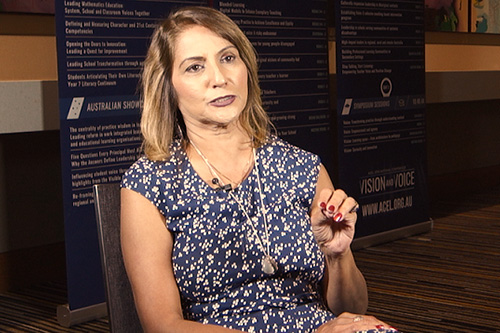
Earlier this month, some of education’s biggest heavyweights, including Todd Whitaker, Michael Fullan, Alma Harris, Lee Watanabe-Crocket, Victoria Brownlee and Dr Douglas Fisher, converged at ACEL’s Vision and Voice conference in Sydney.
The conference theme of ‘Vision and Voice – Setting the Learning Agenda’ provided a platform for international and national speakers to share their expertise, research and best practice in bringing these two key elements to life.
A key part of the conference was an interactive roundtable featuring ACEL’s Academic Advisory Committee – an initiative designed to establish and provide platforms for sharing current research, policy and practice in educational leadership.
In an interview with The Educator on the sidelines of the event, ACEL CEO, Aasha Murthy, highlighted the ways in which the Committee will help to improve educational leadership in Australian schools.
“The advisory committee that we’ve just formed with Professor Martin Westwell [chief executive of South Australia’s curriculum and assessment authority and Committee chair] is about building the connection between research and educational leadership,” Murthy told The Educator.
“We – as an organisation that operates across all school sectors and education levels nationally – have the ability to connect great research that is happening across the country with great practice.”
Another key opportunity of ACEL’s, Murthy noted, was to “create projects from inception to implementation”.
“This can involve creating a project where the research is designed by working with leaders in a school, for example. We can then put that research in place and see how it goes,” Murthy said.
“The role of the Committee is to really look at opportunities by which we can really leverage research and turn it into good practice – and I think that is the fundamental goal of what we’re doing.”
‘A backbone support organisation’
Murthy said the breadth of the Committee’s experience allows it to address a wide range of issues across Australia’s education system.
“The people we have on the Committee operate in various contexts. Their research interests are different, and the levels at which they’re conducting that research are different as well,” Murthy explained.
“And we as an organisation also have that. We have membership that goes from system leadership, to school leadership, to classroom leadership.”
Murthy said ACEL’s role in this context is to be “the backbone support organisation” that “brings together the academic research part of the value chain in a way with practitioners, school leaders, classroom leaders.”
Murthy said some of the top calls to action to come out of ACEL’s National Conference 2019 included the importance of principals understanding their context and strengthening teacher-student communication.
She pointed to some of the conference’s keynotes, such as Todd Whitaker and Dr Douglas Fisher, who addressed the need for leaders to understand their students’ needs.
“Number one in this context is actually talking to students,” Murthy said, adding that increased administrative duties and the fast-paced nature of the job can sometimes cause the human element to fall by the wayside.
“While most educators and leaders understand this, it’s still an important thing to articulate, because when they’re actually in the classroom managing assessments and other responsibilities, this can be overlooked.”
Principals must understand their context
At the conference, Dr Fisher, and other keynotes, spoke about the importance of students driving their own learning and peer coaching others – a practice that Murthy said puts students at the centre of not just learning but the designing of learning and assessment.
“I think that was a big takeaway from all of the three sessions at [Day 2] the conference,” she said.
“And for school leaders, it’s also about understanding their own context. One of the things I was really happy about was how the keynotes spoke to the four sub-teams that we have.”
One of the teams focused on the physical learning environment in schools, which is taking on increased importance as research highlights the benefits of classroom design on student outcomes and wellbeing.
“The speakers discussed learning spaces, from pedagogy to architecture, and then curiosity and innovation – and every one of the speakers touched on these last two in their own context,” Murthy said.
“We talked about understanding your context and empowerment and agency.”
Murthy said one talking point that was consistently raised was how different a regional or remote school’s context can be from that of a metropolitan school to a system leader.
“However, the speakers also discussed how a state like Queensland – with its vast spread and geography – can have similar challenges to Victoria, which is a much smaller state,” she said.
“But the context defines what you can do as a leader. The research will always be applied differently based on the context.”


